User experience & Sophocles
User experience & Sophocles
by Thomas Girard
*
i. Ideas trapped within us
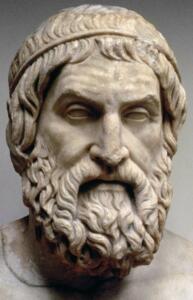
We have ideas within us. They swim through our minds and sometimes move faster than we know what to do with them. A young guy approached me after the event last night and asked me what to do, with all of these ideas he had in his head, that he had no way of keeping track of and communicating to anyone, let alone having them resonate in a way that he could start picking them apart. Ideas trapped within us is the idea that we are all a bit like this, bubbles for ideas that kind of swim around inside of us, and the keyhole that we have to unlock is getting those ideas out. By showing a slide of a person writing on a white board, I began to communicate an idea that we have ideas within us, and through a pen, the ideas can leave us and exist in the real world, through writing. It’s simply writing, there’s nothing special about it. Except for that fact that it is entirely special because it is a manifestation of our ideas. The ideas come out of us through writing and now they exist in the physical world. And there is visibility on them.
— And great wounds before today have taught sense even to the aged…. — Sophocles, Antigone
ii. Manifestation of ideas

In design, there is a notion of a maker. Maybe that person is a ceramics artist, maybe a construction worker, maybe an electrician, maybe a product designer. These people make real physical things that come into the world. Design legend John Maeda talks about the shift away from these craft based makers into a world where people do this through writing, sound, and code, a shift away from the maker. However I don’t see this as a shift. I see writing, sound, and code as forms of making as well. Sure, they aren’t what we ordinarily see as making, because we are making transient things, abstract things, but they are things and they are coming into the world and they exist within us before existing in the world and this process, this transfer is something I call Manifestation of ideas.
For their grand schemes or bold words the proud pay with great wounds…. — Sophocles, Antigone
iii. Iteration
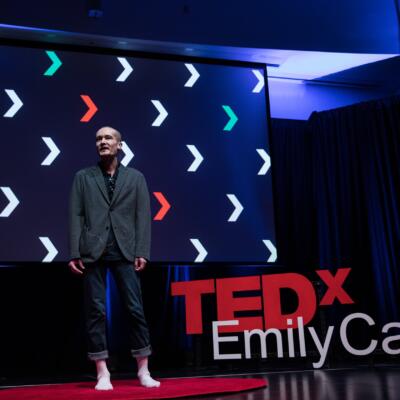
Recently I spoke at the TEDx conferences in Canada at Emily Carr University of Art + Design. I was in the first half, and before the second half we all assembled in the corridor to chat. I was in a group of three people. I was there, as a speaker, as a container for all these ideas running through my head about the talk, about how to memorize, how to internalize, how to be authentic, and of course how to be true to the content I was presenting. Beside me in this group of three was a young woman who was also a speaker, and I imagine had similar ideas inside her, and there was a third person, a guest at the event, who I imagine had all sorts of questions, and thoughts and feedback about the first half of the talks, and the three of us broke into conversation. And in the conversation a Manifestation of ideas was happening. I had my ideas leave my body, I was making, but not at all in the traditional sense because the ideas I was making were sonic, they were sound, they were leaving my body through voice. But they were ideas that were within me and they were then in the physical world, so in a sense I was making. But after that something happened. The ideas were listened to, reflected on, responded to, and then I grabbed the new ideas from the others, and then proceeded to make more ideas. To communicate new ideas. To manifest new ideas. But these ideas weren’t just inside me and leaving me. These were ideas based on the ideas of others. So I was speaking my ideas, getting new ideas from the others, and then speaking more new ideas. And this process is iterative, and it’s cyclical. Ideas are made, and then new ideas are made, and then new ideas are made again, over and over with perhaps the only restriction being an amount of time – time, we have to iterate on our ideas, to generate new ideas.
To be sensible and to be pious are the first and last of happiness…. — Sophocles, Antigone
iv. Coming into the world through writing
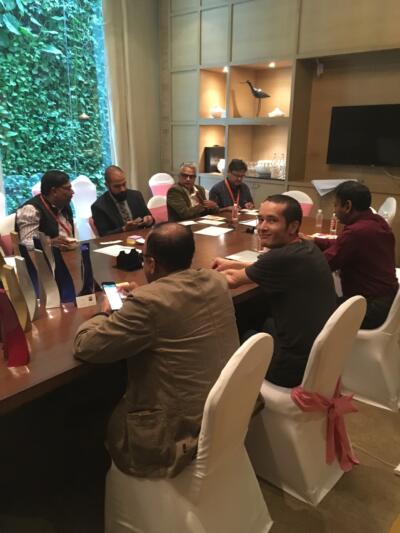
Back to Bangalore, I was sitting at a roundtable as a panelist with other design educators. They all have brown skin except me. Top people at universities around India, and we were chatting. There were eight or ten of us at the table, and we were sharing out ideas. We were making. We were doing Manifestation of Ideas. But there were eight or ten of us there, so a huge amount of complexity. I’m sharing my ideas through voice at first, and then listening to eight or ten others before iterating, before saying more new ideas through voice. And then a third impartial person pulled out some paper on an easel, and starting writing our ideas down. So now the ideas are coming into the world through voice and writing, and they are coming into the world through iteration. So lo’s of complexity, but again we are just making through conversation and writing stuff down, so hugely simple. And arguably not even qualifiable as making.
You honour higher than all others, here, where lightning was your father. Now that a violent sickness holds the nation and all its people, come, over the slope of Parnassos, over the groaning channel, walk here and heal us. — Sophocles, Antigone
v. Coming into the world through speech
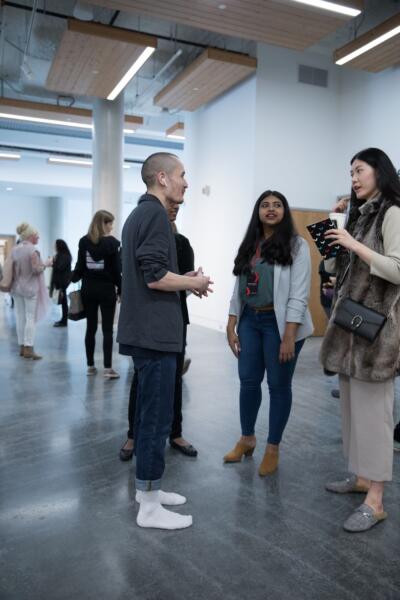
And back to Canada. 29 audience members, preparing for the workshop portion of our evening which I have to run. “Have any of you been to Creative Mornings?” I ask. People pair up and turn their chairs towards one another and begin the session. The rules are minimal. One person represents a product and one person represents a user. I suggest one person is Siri and another is the user of Siri. Conversations begin. Great energy in the room. It’s working. I set my timer on my iPhone for ten minutes. And time ticks down. People are talking. People are making.
Sun-blaze, shining at last, you are the most beautiful light ever shown Thebes over her seven gates; and now, higher, widening gaze of gold day, you come, over the course of our west river. In whole armour Come out of argos (his shield shone white) you have expelled the man, exiled in unbridled and blinding flight. Out of the crisis of dubious quarrel Polynieces had roused him against our country. As shrill as an eagle on wings white as snow he flew onto the country, feathered in armour. — Sophocles, Antigone
vi. Our current technology

So wait, pen and paper are technology? Professor Haig Armen at Emily Carr University of Art + Design convinced me of this. We had an open house day and an older man came into the interaction lab, feathers in a mess, and asked what all this is. I scrambled. I pulled out a chair and said “You see what I did, I just pulled out a chair. There’s a huge amount of complexity there that we don’t see. We need the chair and me to pull it out, but the way in which I pull it out, the support from the chair to enable me to perform that action is the route of interaction”. Haig jumps in. “Industrial Design is the making of the chair, the ergonomics, the health factor, or the human factors as we call them – making the chair just right for people. But Interaction design is something else.” Haig and I have conflicting views and the old man tries to pick us apart. But he sees what we are saying. This is about people. And our technology these days is only at all relevant through people. And understanding people.
Your devotion is a kind of reverence. Power, though, must be revered, not trampled by those who must wield it. — Sophocles, Antigone
vii. Pen and paper

So now we know, pen and paper are technology. Why wouldn’t they be? Many support the myth that complex digital things are technology. Or the VCR that we never learnt how to use is technology. Technology is impossible. Technology is difficult. You need to be smart to use technology… it’s false. Technology enables. Pen and paper is one example, but pen and paper are actually quite complex, we can go even more simple.
You were harsh and daring, child. You went too far and fell broken against the lofty pedestal of Justice. Perhaps, though, you are paying for some ancestral failing. — Sophocles, Antigone, p. 54
viii. Design by committee
There is a phrase, too many cooks in the kitchen, that is now truer than ever within user experience. These days we see a rise in what we call user experience research, which is basically bringing a lot of people into a room with a lot of different backgrounds and together, they generate new and interesting ideas. People butt heads. Arguments ensue. No one wants to solve this. And design becomes a myth about how designers make more problems than they solve.
Desire, you, unconquered war; Desire, vaulting upon dear goods; at night you rest on young girls smiles, then travel, grazing the deep ocean, to visit the far dwellers whose houses are fields. The deathless gods cannot escape, or humans whose whole life is a day. Welcoming you, they run mad. — Sophocles, Antigone
ix. Visibility
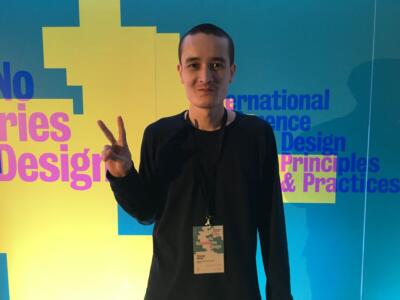
Ten or 15 years ago I joined the dot com era with my first job title that included the words “User Experience.” What was this “User Experience,” I wondered. And why was I uniquely qualified to do it. I went into work everyday. Booted my Mac up. Made some stuff in Photoshop. Talked to my product manager. Had meetings. Lots of meetings. Then one day user experience happened. And I’ll tell you how it happened – There is a thing called JIRA, which keeps track of tickets. Computer Science people who code all day make JIRAs whenever there is a problem, and the JIRA pops up on everyone’s computer saying what the problem is. And everyone is like hmm. Interesting. At first a couple JIRAS are there, and then there are lots of JIRAS, and then there are a shit ton of JIRAS. The house is on fire now. We gotta do something about these JIRAS. And so we have a meeting. Great group of people, I know this because someone breaks the mould, writes his JIRA on a sticky note, and puts it up on the wall. “We’re gonna do this with our JIRAS. We’re gonna put them all on the wall, so we can all see them.” That’s when I learnt about visibility. All these ideas that exist are made visible. It was that day I learnt what I signed up for. User Experience was this visibility.
Lucky those whose lifetime knows no trouble. The house quaked by the gods lacks no form of disaster creeping after all the clan; like swellings of ocean, when evil north winds breathe, that run on the abyss of brine and roll black sand up from the chasm – and headlands beat them back but bellow, wailing, wind-worn. — Sophocles, Antigone
x. Role Play
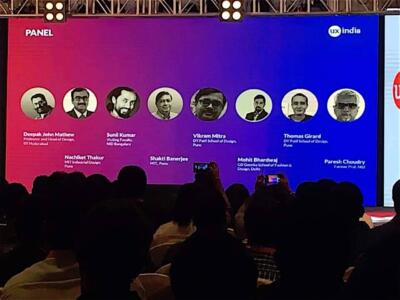
And so, ta-da, I am certified in Role Play. Wait, what? It’s okay, most people don’t know what it means. In fact, I am still wrestling with what it means. However, I entered a room in Bangalore and left certified. More than that though, I left with purpose. The purpose or impetus to bring this idea back to Canada. So a couple of nights ago I’m in front of a room of 30 User Experience people, and they’re like, “What is this Role Play”, and everyone’s feathers are in a mess. I scramble. Pass around a mic. and one person jumps up. “I do role play at work!” I’m right. I have evidence. Stress subsides. Now everyone is talking. Everyone is doing role play. I run the role play workshop in two parts. In both parts there were a pair of participants, one person was the product and one was the user. And the two talk to each other. For the second part, I introduce technologies – one person is the user and one person is iOS, or one person is the user and one person is Alexa. They talk to each other. Now times up. Now we act it in front of everyone. It’s working.
The breath of his life he has taught to be language, be the spirit of thought; griefs, to give laws to nations; fears, to dodge weapons of rains and winds and the homeless cold – always clever, he never fails to find ways for whatever future; manages cures for the hardest maladies; from death alone he has secured no refuge. — Sophocles, Antigone
xi. No Fidelity
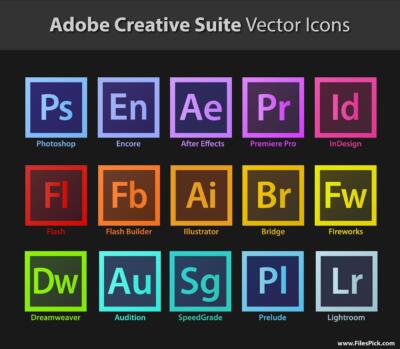
Complex digital products like Adobe Creative Suite and Raspberry Pi Operating systems, where you input commands using command line or weld together electronics, feel like they are authentically true ways of making things. And that making, at that level, is a level of fidelity. And often, we want to be just like this – as real as possible when trying out things, when prototyping things, so we up-and-up-and-up the level of fidelity. We start fairly low and we up-and-up and-up the fidelity. But what happens when we go the other way. What happens when we reduce the fidelity. Did you ever think of how complex, how much fidelity there is in a conversation. Yes, it’s just two people talking, but people have the ideas, and are speaking the ideas, there is a time element, so people are constrained by the amount of time they can speak, and the amount of time allotted for the duration of the conversation, and these bits and bobs are things we are entirely reliant on. What if a person can’t speak. Well, that ends it right there. But thats what we are dealing with here. Because there is no such thing as No fidelity. Because no matter how much you reduce and reduce and reduce the parameters, the limitations, the components that we are allowed to use, we are always left over with something. Something has to be there. And that something is a very, very low fidelity.
Many marvels walk through the world, terrible, wonderful, but none more than humanity, which makes a way under winter rain, over the grad deep of the sea, proceeds where it swells and swallows; that grinds at the earth — unwinding, unwearied, first of the gods– to its own purpose as the plow is driven turning year into year, through generations as colt follows mare. — Sophocles, Antigone
xii. Top down

Alas, Bangalore. Bangalore all over again. I’m at the roundtable discussion again. “Bottom up!” I say. I know what I’m talking about. I’ve heard it from powerless people. They have good ideas. And those ideas need to be heard. That’s what bottom-up is. “But India is an emerging market” they insinuate “And we are people of power. Let’s make rules for our people. This is what they crave. Rules.” The conference ends. I come back to Vancouver with top down mentality in mind, but I’m sceptical. “What do you mean by top down and bottom up?” the audience member in Canada asks me at my talk. “How do we get there”. Shit. Another unsolvable problem. A wicked problem. A feedback loop. I’m stifled “Bottom-up!” I say again. I feel like Hitler. or Trump. “Bottom-up Bottom-up Bottom-up Bottom-up!” Maybe if I repeat myself something will happen.
Zeus hates the noise of a bragging tongue. When he saw them come against us in a great gush, grandiose with splashing gold, he whirled fire; and the man who was rushing like a racer to the goal on the heights of our battlements and was signalling victory, Zeus hurled him down with that fire. — Sophocles, Antigone
xiii. Prototyping Workshop
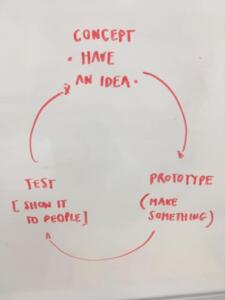
Empowering young designers or tech people or students, is what I aim to do. And if I do that then I’ve succeeded. There are many ways to do things that benefit myself, and one might argue that empowering people by giving them my ideas, is a form of retaining power. If I was capable of such malevolence, I would probably be much better off. But I’m just a guy with some ideas so let’s start and end there. Or in sum, this paper describes an impetus I had, after travelling to India, to return to Canada and share my ideas. These ideas resemble a kind of bricolage of ideas on the page, a loose terms of agreement for a reader so they can say “We learnt that. It’s real.”
Victory comes bringing glory to Thebes, answers a smile to our many chariots that cheer her. Now that the war is over, forget war. We’ll visit every god’s temples, for a whole night, dancing and chanting praise. Dionysus leads us, rules Thebes, makes the land tremble. — Sophocles, Antigone
*

Thomas Girard (born 30 December, 1980 in Vancouver) is a Canadian scholar. Girard was accepted to attend the University of Oxford in lectures equivalent to graduate coursework. Girard has received several Emerging Scholar awards, first at the Design Principles and Practices conference in Barcelona at the prestigious ELISAVA. At Emily Carr University of Art and Design he received his second Emerging Scholar award. Other awards include RBC Emerging Scholar, Royal Bank of Canada Foundation. For 2021, he has been awarded an Emerging Scholar award from the New Directions in the Humanities conference in Madrid. He is a 2022 graduate of the Graduate Liberal Studies programme at Simon Fraser University. He will present “User Experience and Sophocles” at the Seventeenth International Conference on Design Principles & Practices in Lisbon, in March 2023. Editor’s note: Thomas Girard has written two previous essays for The BC Review, Teaching typography in quarantine (also to be presented here) and Podiums, prototypes, and Plato. He has also reviewed a book by Ron Wakkary.
*
 Works Cited:
Works Cited:
Sophocles, Antigone [written ca. 441 BC]. Translated by Richard Emil Braun (New York: Oxford University Press, 1973)
*
The British Columbia Review
Publisher and Editor: Richard Mackie
Formerly The Ormsby Review, The British Columbia Review is an on-line journal service for in-depth coverage of BC books and writers. The Advisory Board consists of Jean Barman, Wade Davis, Robin Fisher, Cole Harris, Hugh Johnston, Kathy Mezei, Patricia Roy, Maria Tippett, and Graeme Wynn. Provincial Government Patron (since September 2018): Creative BC. Honorary Patron: Yosef Wosk. Scholarly Patron: SFU Graduate Liberal Studies.
“Only connect.” – E.M. Forster
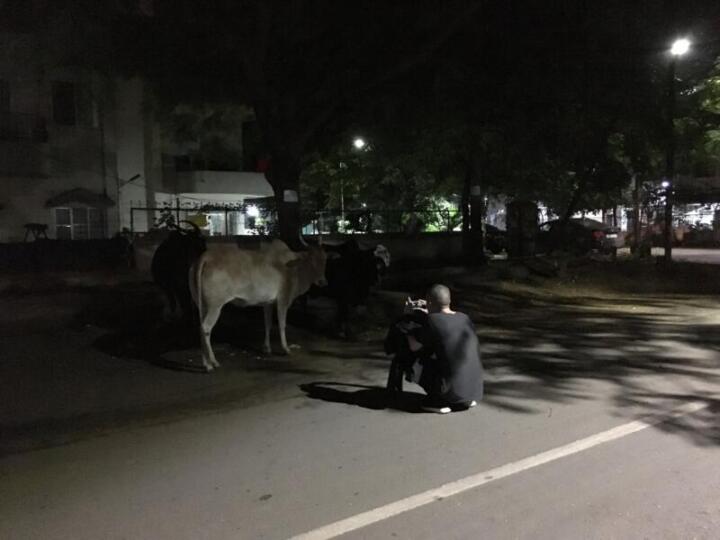

































8 comments on “User experience & Sophocles”